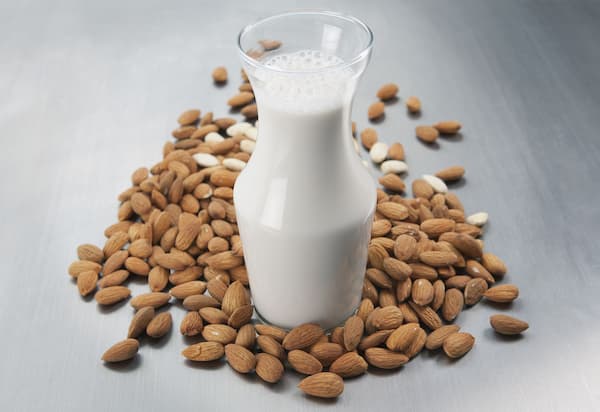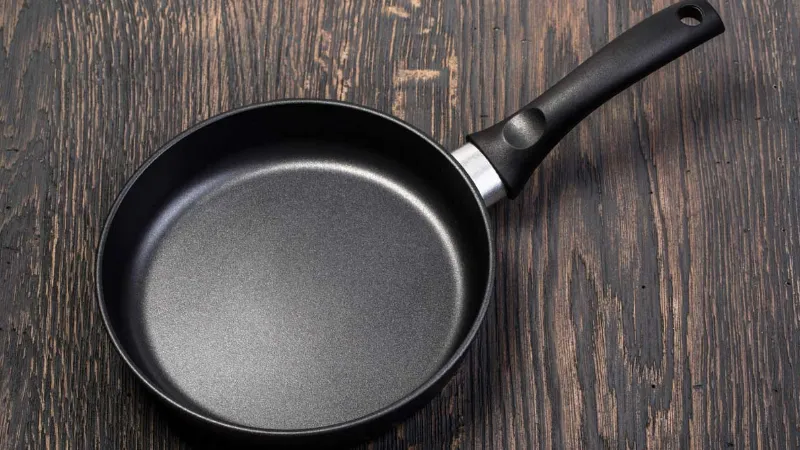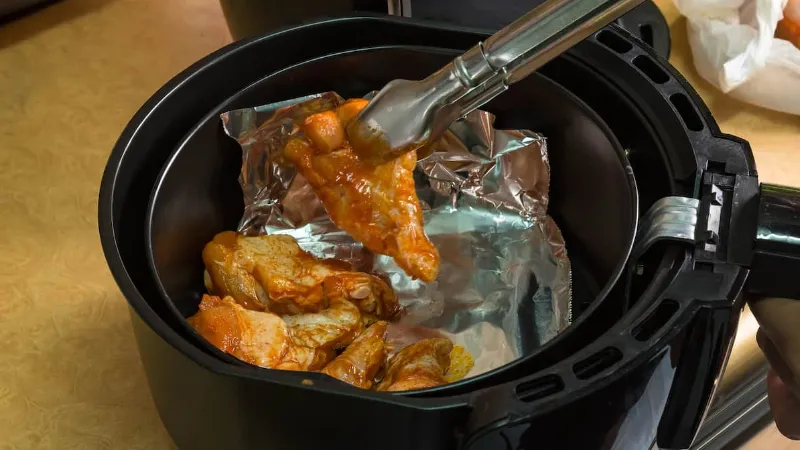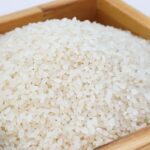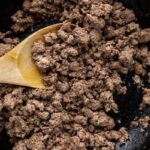Can You Microwave Almond Milk? True Or False?
Yes, you can microwave almond milk. The best practices and safety advice are condensed into a small number of guidelines.
And if so, for how long and at what temperature should you microwave it? How long to microwave almond milk for, and proper technique. It seems to be, but there are some considerations.
We’ll provide you with the answers to your burning inquiries in this blog post, as well as some advice on how to microwave almond milk correctly!
We’ll also provide you with some useful advice on how to prepare the ideal cup of almond milk in the microwave. Continue reading if you want to learn the best method or just want to save time!
Let’s get started…
Table of Contents
What is Almond Milk?
Despite the fact that almond milk contains the word “milk,” it’s not a dairy product. It’s actually a smooth, creamy plant-based beverage that resembles dairy milk that is produced by blending almonds and water, then straining the resulting mixture.
Almond milk can be consumed hot or cold, in coffee or tea, on cereal, or simply in a glass, just like any other type of milk. Additionally, you can use it in any recipe that calls for milk when baking and cooking.
It’s simple to find almond milk in the grocery store. The differences between homemade and store-bought almond milks can usually be seen in the ingredients. Store-bought almond milks frequently have stabilizers and thickeners for a longer shelf life, as can be seen if you look at the boxes.
Can You Microwave Almond Milk?
Therefore, is almond milk microwaveable or not? Almond milk can indeed be heated in a microwave. When microwaveing almond milk, there are a few things to remember.
You must use a microwave-safe container for your almond milk, first and foremost.
The best containers are made of glass or ceramic, but if you must use a plastic one, make sure it is microwave-safe first. The milk could explode in a microwave-unsafe container.
Before placing the almond milk in the microwave, it is crucial to thoroughly shake it. By doing so, the heat will be distributed more evenly and the milk won’t burn.
You must then choose how long to microwave your almond milk for. The general rule of thumb is that almond milk should be microwaved for one minute per cup. If you cook the milk for any longer, it might begin to curdle. Nevertheless, this might need to be adjusted based on the power level of your particular microwave.
Last but not least, be sure to heat your almond milk on medium power. Almond milk can overheat or boil over when heated on a high setting. The milk must not be overcooked or it will thicken and lump.
These are the fundamentals of microwaving almond milk, then! Let’s now discuss heating up almond milk in the microwave.
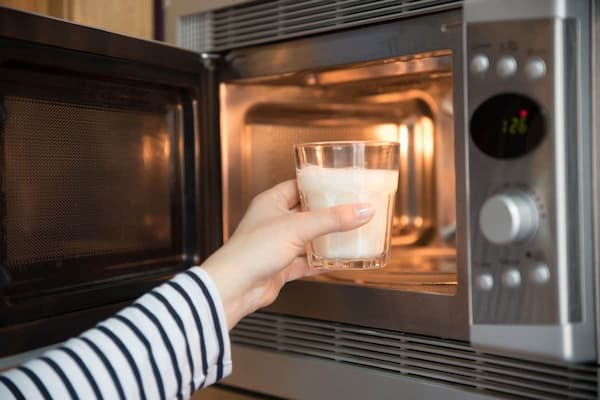
Is It Safe to Heat Almond Milk in the Microwave?
Yes, you can microwave almond milk without any problems. However, as was already mentioned, there are three problems that could occur when heating milk in the microwave: bottom-burning, boiling, and curdling.
Curdling will be discussed first. Although there is no risk, curdled milk has an unfavorable taste. Regarding the second and third concerns, it’s crucial to avoid letting almond milk boil when heating it in the microwave or through other means. Almonds that have been burned will taste terrible once the milk has boiled.
Additionally, milk is much less healthy after boiling than before because, like other types of milk, the boiling process denatures a large portion of its nutritional content (protein).
Learn about Can You Microwave Sour Cream?
How Long Does It Take to Warm Almond Milk in Microwave?
You may be curious as to how long it takes to warm almond milk in the microwave once you are aware of whether you can microwave almond milk and how to do so.
Almond milk can be quickly and easily warmed in a microwave. Almond milk should generally be microwaved for one minute per cup. Warming up 8 ounces (240 ml) of almond milk in a microwave on high power takes about a minute. When it is finished, the milk will be steaming hot.
The milk should not be overcooked because it can burn and taste bad. It might take a little bit longer to heat up if you are making more milk. While the milk is heating up, stir it every so often to help the heat be distributed evenly.
Until the milk is heated to the desired temperature, we advise starting with one minute and then increasing the time in increments of 30 seconds.
In any recipe that calls for cow’s milk, heated almond milk can be substituted. As a hot beverage, it can also be savored on its own.
What is the Best Temperature for Heating Almond Milk?
Since different people have different ideas about the ideal temperature for heating almond milk, there is no clear-cut answer to this query.
However, most people seem to agree that the best temperature for heating almond milk is between 160-170 degrees Fahrenheit (71-77 degrees Celsius). The milk will be heated while remaining unburnt or bitter if the temperature range is followed.
Almond milk can become bitter and too hot if heated above this point. If it is heated below 160 degrees, on the other hand, it might not be warm enough to be enjoyed.
Tips for Microwaving Almond Milk
As a dairy-free and vegan-friendly substitute for cow’s milk, almond milk is popular with many people. But what if you don’t have a refrigerator or don’t want to bring a cooler when you travel?
Almond milk can be heated in the microwave, but there are a few guidelines to remember to get the best results.
- Prior to heating up in the microwave, make sure the almond milk is cold. This will lessen the likelihood of it boiling over.
- When heating almond milk, make sure the container is microwave-safe.
- Depending on the strength of your microwave, start with a short cook time of 30 seconds and work your way up to one minute.
- The milk should not be heated past 170 degrees Fahrenheit (77 degrees Celsius).
- To keep it from scorching or boiling over, stir the almond milk every 30 seconds.
- When you take the almond milk out of the microwave, exercise caution because it will be hot. Before drinking, let it cool for a while.
- A blender or an immersion blender can be used to froth milk if you don’t have a handheld frother.
- Make sure not to overfroth the milk. When milk is overfrothed, it can become bitter and unpleasant to drink.
- Almond milk should be used within a day or two if you have any leftover, so make sure to store it in the fridge.
Once you learn how to microwave almond milk, you can sip on this delectable brew whenever and wherever you like. To ensure that it always comes out correctly, just remember these easy tips.
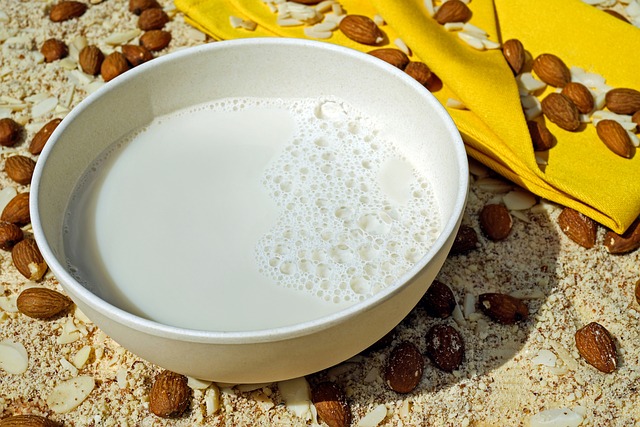
How to Heat Almond Milk in the Microwave?
Guide on How to Heat Almond Milk in the Microwave
A delicious cup of warm milk can be made easily and quickly by heating almond milk in the microwave. Here’s how to do it:
Step 1: In a dish that can be heated in the microwave, pour the desired quantity of almond milk.
Step 2: Heat the milk to the desired temperature by heating it on high for 45 to 60 seconds.
Step 3: Enjoy as is or incorporate into your favorite recipes after thoroughly stirring.
Some Ways to Heat Almond Milk in the Microwave
Almond milk can be microwaved in a number of different ways. Here are three of our favorites:
- Heating Almond Milk in a Glass Jar
Almond milk is best heated in the microwave this way. You just need to pour the almond milk into a glass microwaveable jar, give it a good shake, and microwave it for one minute per cup on medium power. Check for Can You Microwave Mason Jars?
- Heating Almond Milk in a Ceramic Mug or Cup
A ceramic mug or cup can also be used to heat almond milk if you don’t have a glass jar on hand. Simply pour the almond milk into the mug or cup and microwave it for one to two minutes on medium power. Before drinking, make sure to thoroughly stir the milk!
- Heating Almond Milk in a Plastic Container
Make sure the plastic container you’re using can be heated in the microwave. The milk might blow up if it isn’t. Pour the almond milk into the container, and then microwave it for one minute per cup on medium power. Before drinking, thoroughly stir the milk.
Does Almond Milk Curdle When Heated?
Because soy milk is so versatile, it can be used for almost anything that cow’s milk can be used for. This includes brewing coffee, blending smoothies, and even baking. It does not fare well when heated, despite its adaptability. Heat can cause the milk to curdle, resulting in coagulated solid pieces that are undoubtedly unpleasant.
The best way to prevent soy milk from curdling is to heat it slowly and gently, whether in the microwave or another method.
You must temper almond milk if you plan to use it as a dairy-free substitute in your coffee to keep it from curdling. This simply means that you should start by mixing a small amount of almond milk with some hot coffee or espresso before gradually adding more of each until they are combined in an equal amount.
Different Types of Plant Milk
Almond milk is a preferred milk option more often than not these days. There are many cafes and eateries where you can find it.
Here are some of the other plant milks you can buy (or make):
- Soy milk
- Cashew milk
- Hemp milk
- Rice milk
- Coconut milk
- Pea milk
- Oat milk
- Flax milk
Which of these milks? Can these also be warmed in a microwave?
The appropriate plant milk for the microwave should be, is the answer. You should be fine if you adhere to the fundamental guidelines for microwave-safe almond milk preparation.
Different plant milks may, however, behave slightly differently in the microwave. When heated to extremely high temperatures, some may change slightly in consistency, and if you’re making a latte, some may foam better than others.
However, you can microwave plant milk.
Is Almond Milk Healthy?
Almond milk’s processing has some people worried. Undoubtedly, if you have a dairy allergy or intolerance or are lactose intolerant, almond milk is one of the healthiest things you can add to your diet.
Almond milk, which is made from almonds, is higher in vitamin E than cow’s milk and has fewer saturated fats and no cholesterol. Consider almond milk if you’re looking for a dairy alternative that’s better for you than regular cow’s milk.
How Can You Tell If Almond Milk Has Gone Bad?
It’s a good idea to make sure the almond milk is still fresh before consuming it. Despite the fact that the packaging of the majority of almond milk varieties includes a sell-by date, it is always a good idea to check for spoiled milk.
When you open a fresh container of almond milk, you should check the expiration date first. You shouldn’t probably drink it if the expiration date has already passed.
If the milk still smells or tastes off, even though the expiration date has not yet passed, do not take a chance and throw it away. Although the majority of almond milk brands are fine even after their sell-by date, it pays to be careful.
Labels on Almond Milk to Be Aware Of
The most widely used label on microwavable products is “microwave safe.” It’s also possible that the products’ labels will state that they shouldn’t be microwaved.
But don’t worry if you can’t find any labels. These kinds of labels might not be present on plant milks, which could be confusing given that the boxes they are packaged in aren’t microwave-safe.
The absence of a label does not imply that the milk cannot be microwaved. If you’re uncertain, you can do some research to find the solution.
Conclusion
Almond milk can therefore be microwaved. Yes, provided that you take the required safety precautions and observe some guidelines. Heating slowly and carefully is essential for a successful microwave process. There is nothing else to be concerned about when it comes to microwaving milk. It’s fairly simple and easy to understand.
FAQs
Is Almond Milk Gluten-free?
Yes, almond milk is gluten-free. For those with celiac disease or gluten intolerance, it’s a fantastic substitute. Enjoy almond milk’s many advantages without worrying about gluten.
How Long Can Almond Milk Sit Out?
Almond milk can be left out for up to 24 hours before going bad. You should discard it after this point, per advice. Make sure to keep your almond milk in a cool, dry place to avoid it spoiling too soon.
Put it in the fridge if you won’t finish it within a day. Longer freshness will result from this.
Does Heating Almond Milk Destroy Nutrients?
A certain amount of the nutrients can be destroyed by heating almond milk. Almond milk is still a nutritious and healthy option, so this is not a serious concern. You shouldn’t worry too much about the nutrients that are lost during heating since they are usually not vital to health.
Are There Any Dangers When Heating Almond Milk With the Microwave?
Yes, there are possible risks associated with microwave heating of almond milk. Any liquid that is microwaved runs the risk of getting overheated.
This implies that the liquid can get hotter than its boiling point without actually boiling. In this case, stirring the liquid could cause it to violently boil up suddenly, seriously burning anyone who touches it.
Make sure to carefully and slowly warm almond milk in the microwave, stirring frequently, to prevent this. As soon as it reaches the desired temperature, stop heating it. Prior to eating, give it a minute to rest since it might continue to cook a little after being taken out of the microwave.
Why Does Almond Milk Curdle in Coffee?
As a result of the milk’s proteins’ instability at high temperatures, almond milk can curdle in coffee. These proteins may denature and clump together when exposed to hot coffee. Since the milk will become thick and lumpy as a result, the coffee may not taste as good.
Use a dairy-free creamer or a stabilizer like cornstarch or arrowroot powder to stop your almond milk from curdling. Before adding the almond milk to your coffee, you can also heat it on its own.

